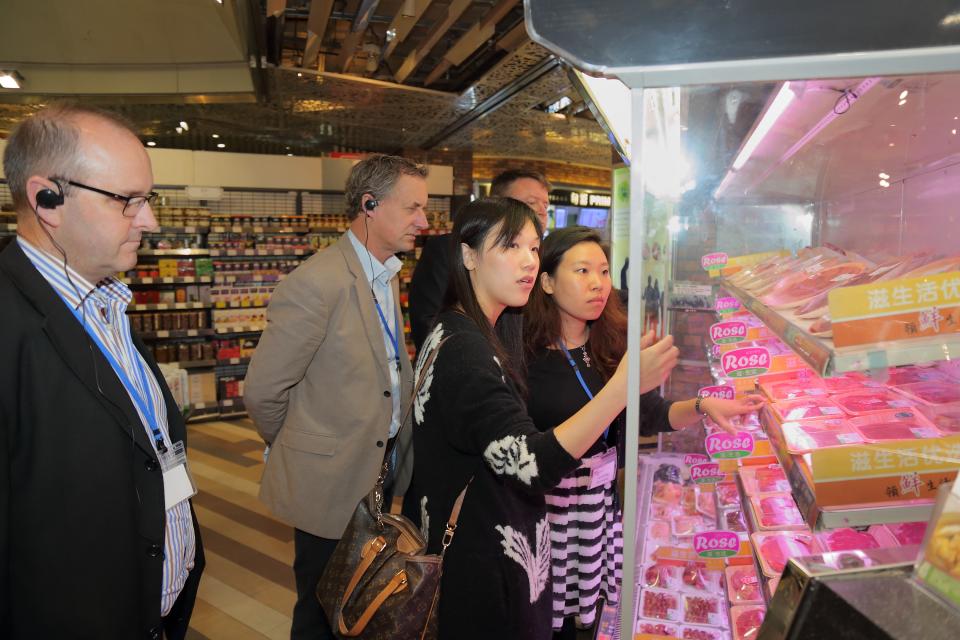Kiwi companies up focus on China market
Tuesday, 03 May 2016
Forget our Western orthodox ways of doing business if you want to see success in China, is the message from one senior New Zealand executive following a week-long programme with 20 other New Zealand business leaders in Shanghai covering both the huge potential that China represents and the pitfalls that await the unwary.
The programme, called “Accelerate China” was run by NZTE to support Primary Collaboration New Zealand (PCNZ), a ground-breaking group of six companies - Silver Fern Farms, Kono, Sealord, Synlait, Pacific Pace and Villa Maria. Recently marking its first anniversary, PCNZ operates an office in Shanghai, which allows the firms to share costs and facilities, as well as pool information and strategies on how to get the most out of the China market.
"You can forget our Western orthodox ways of doing business because China is a new market for us and it has new models of engagement with the consumer that are really interesting and fast moving," said Rachel Taulelei of Kono, a founder member of PCNZ selling seafood including Greenshell mussels into the China market.
"It really pays to understand the rules of engagement before you jump into this market, and I think there is an enormous amount of information in the local networks here, primarily the NZTE and PCNZ networks," she added. “I am an enormous fan of the ‘NZ Inc’ approach to any market, but particularly a market as big and as noisy as this one.”
China’s newly-emerged and increasingly prosperous middle class represent a huge opportunity for New Zealand, and the executives on the “Accelerate China” programme visited the homes of Shanghai consumers and met with distributors and focus groups. Key issues on the agenda included the booming e-commerce / home delivery channels that are dramatically changing China's retail world.
"The whole idea was to bring the leaders up from the (PCNZ) shareholder members and get them immersed in what it means to do business in China," said Andy Borland, PCNZ Chairman. "We also focused on where to go next, how we should be direct in our growth aspirations, and if we should be going harder at the e-channel, for instance."
NZTE’s Trade Commissioner in Shanghai, Damon Paling, said PCNZ offers a unique opportunity for companies looking to get into China.
“From a market entry viewpoint, establishing a representative office yields limited value-add while some companies may not yet have the business case for incorporating a wholly foreign owned enterprise,” he said. “PCNZ, as a platform for doing business, falls nicely in between whereby like-minded companies at a similar stage in their China business phase can readily create and share as they take their products to Chinese consumers.”
The general manager of PCNZ's Shanghai office, Kevin Parish said the key takeaways for company executives who attended the intensive China week of meetings were: "The unique size of it, the immense opportunity, the absolute complexity, the strong competition from other countries that want in as well."
“We set this up to pass on more knowledge to those in governance roles (in member companies) so they will be able to make more informed decisions around this market and about what it takes to be actually successful here. I think we definitely got that,” he said.
New Zealand has a unique place in the hearts and minds of Chinese consumers as a source of clean, quality food products, and sales of seafood, meats, fruit and other products have boomed in the past decade. Total sales by New Zealand food producers to China have approximately doubled since 2010, and market potential is clearly bigger than any other market in the world.
Seafood producer Sealord is another of the PCNZ partners in Shanghai, and CEO Steve Yung said the company was planning to expand its management presence in the market to push growth.
"We want to put a resource into China, to be a little closer to the market and get a first-hand opportunity to understand how fast things are changing in China and what that means," he said. "With this pace of change, if you get it right, you can be very successful, if you get it wrong, you will be unsuccessful."
"I don't think China is easy," he added. "Just because it is large and growing doesn't mean it is easy. It is quite a sophisticated market."
The week also saw sessions on some of the problems companies can face in China, including regulatory obstacles, problems involving protection of brands and trademarks, and often low margins in what is becoming a key channel for the future of sales – e-commerce.
“The new models are largely around e-commerce,” said Kono’s Rachel. “It's partly to complement existing models, so you have your online and your offline, and I think one of the greatest things I took from this week was to focus on the consumer first and the channel second, to really understand who we are targeting in this market.”
Andy Borland says he’s targeting just the top end of the China market. "But even if it is just the top five percent, it is so massive. They appreciate and want high value and high quality goods, and that's what we are all about as a country.”
But given the complexities and the stiff competition in the China market, should New Zealand exporters look elsewhere for growth?
"No way," said Borland. "They are sunk if they ignore this market."


